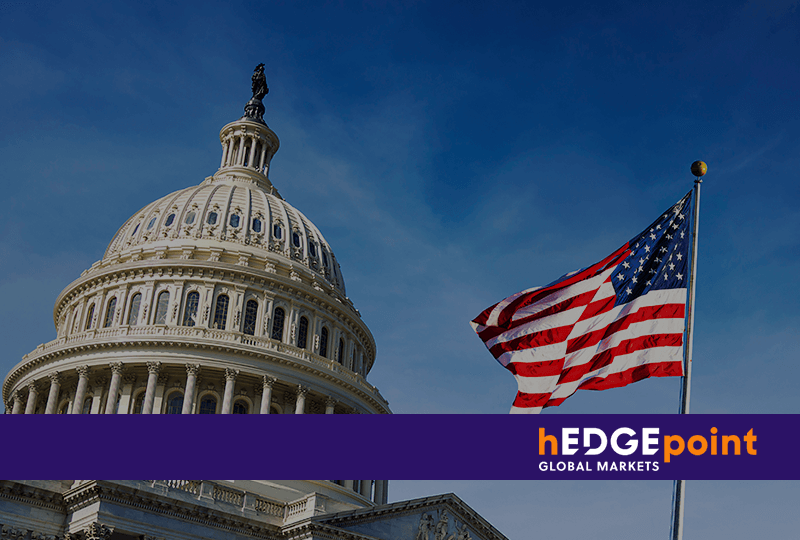
We’ve arrived at that time of year when the debate over the budget in the United States typically takes place. If not approved, the country goes into shutd

We’ve arrived at that time of year when the debate over the budget in the United States typically takes place. If not approved, the country goes into shutdown, which obviously interferes with its entire internal organization, while attracting global attention. After all, the country does have the largest economy on the planet.
In international financial markets, the situation deserves to be highlighted, as there’s always the risk of increasing asset volatility. We invited Victor Arduin, Market Intelligence Analyst at hEDGEpoint, to better explain:
Keep reading to learn more!
What exactly is the shutdown, and what’s the actual state of negotiations?
The shutdown in the U.S. is the period in which the North American government discusses its budget for the following fiscal year. If consensus isn’t reached, this means that several government services will necessarily be stopped.
The U.S. needs to carry out its budget allotment annually. According to national law, approval must occur by the first day of October, Arduin explains.
“When Congress cannot reach an agreement, public sector entities can’t spend money. This creates a scenario where essential services are paralyzed,” he continues.
The budget’s form is essential as it determines the country’s priorities, such as spending on defense, health, education, and others. In addition, it includes discretionary expenses which are those that may or may not be carried out, according to the revenue forecast. They’re divided into 12 agendas that must be approved by both the Congress and the Senate, related to issues such as agriculture, trade, and energy.
The stoppage can be total, if none of these 12 bills is approved, or partial. If an agreement can’t be reached, the government usually resorts to stopgap measures, a temporary situation that postpones the budget’s definition. This is the dilemma we find in the U.S. right now.
“This year, there was an agreement to postpone the shutdown. In other words, Congress used legal instruments to guarantee the country’s operation for at least another 45 days,” Arduin pointed out.
What have been the biggest shutdowns in U.S. history?
The last three largest shutdowns in the U.S. happened during the Bill Clinton, Barack Obama, and Donald Trump administrations.
“The average shutdown lasts eight days. But in those governments, the extension was more substantial,” Arduin recalled.
In 1995, under the Bill Clinton administration, activities were suspended for 21 days all told. Disagreements over budget cuts between the Democrats and House Speaker Newt Gingrich resulted in that shutdown.
Back in 2013, the impasse arose due to the “Patient Protection and Affordable Care Act” (PPACA). Sanctioned in 2010, and popularly known as ObamaCare, it aimed to expand health insurance coverage, thus democratizing the population’s access.
The Republican-controlled House of Representatives was determined to dismantle or delay the law’s implementation by arguing against tax increases. The Democratic-controlled Senate opposed those efforts and simply didn’t accept funds being withdrawn from the program. What was the result? A shutdown for 16 days due to this lack of agreement in Congress.
However, it was as recently as 2018 that the government entered the longest shutdown in history, lasting all of 35 days. The impasse occurred because Donald Trump, president at the time, would only approve the budget if another US$5.7 million was included. The objective was to allocate this money to fortify the border wall between the U.S. and Mexico. But the Democrats opposed the request.
As a result, several government agencies were partly closed while approximately 800,000 federal employees were impacted, having to work without pay. Government services operated with limited capacity or were interrupted. All in all, it’s estimated that the shutdown deprived public coffers of US$11 million.
The Shutdown: Find out the local and global economic effects
Although the shutdown tends to have more local effects, there’s always the risk of it developing into a larger crisis impacting global financial markets. In 2018, for instance, the stock exchange performed unfavorably due to the shutdown, adversely affecting company stocks worldwide.
“The negative effects tend to be more specific and limited to the United States. The shutdown has never become such a big problem that it’s impacted the entire world,” elaborated Arduin.
He also highlighted that there’s no substantial connection that affects the demand for commodities. What’s observed is that the risk of a shutdown is increasing in the U.S. In practice, this translates into higher interest rates, which can have consequences for future commodity prices.
“In the short term, there’s a reduction in consumption by a considerable portion of the population due to the interruption of specific services and delays in wages. There’s also a decrease in the acquisition of goods and services by government agencies. In the medium and long terms, there’s a greater fiscal risk, translating into higher interest rates,” Arduin continued
The economic contraction is temporary and must be recovered through budget normalization. However, if the shutdown carries on, it can hit the private sector more severely.

“The market prepares itself by envisioning what could happen but assumes there’ll be a solution within these 45 days. If the basis of opposition to the current government is very strong, risky asset markets could face volatility, like the situation in 2018,” Victor Arduin affirmed.
hEDGEpoint: Full analysis of all factors that can affect commodities
Closely monitoring all movements that have the chance to affect commodity markets is vital for anyone working in this sector. At hEDGEpoint, we’re always aware of the events that lead to such potential changes.
With this in mind, we offer suitable hedging instruments to help you make more assertive decisions. We work with a team that truly understands all the aspects that generate volatility in commodity markets. We provide hedging products capable of giving greater protection to players at all stages of the chain while combining market intelligence with detailed data analysis.
Talk to a hEDGEpoint professional today to find out more.

Rua Funchal, 418, 18º andar - Vila Olímpia São Paulo, SP, Brasil
Contato
(00) 99999-8888 example@mail.com
Section
Home
O que Fazemos
Mercado
Quem Somos
HUB
Blog
Esta página foi preparada pela Hedgepoint Schweiz AG e suas afiliadas (“Hedgepoint”) exclusivamente para fins informativos e instrutivos, sem o objetivo de estabelecer obrigações ou compromissos com terceiros, nem de promover uma oferta ou solicitação de oferta de venda ou compra de quaisquer valores mobiliários, commodity interests ou produtos de investimento.
A Hedgepoint e suas associadas renunciam expressamente a qualquer uso das informações contidas neste documento que direta ou indiretamente resulte em danos ou prejuízos de qualquer natureza. As informações são obtidas de fontes que acreditamos serem confiáveis, mas não garantimos a atualidade ou precisão dessas informações.
O trading de commodity interests, como futuros, opções e swaps, envolve um risco substancial de perda e pode não ser adequado para todos os investidores. Você deve considerar cuidadosamente se esse tipo de negociação é adequado para você, levando em conta sua situação financeira. O desempenho passado não é necessariamente indicativo de resultados futuros. Os clientes devem confiar em seu próprio julgamento independente e/ou consultores antes de realizar qualquer transação.
A Hedgepoint não fornece consultoria jurídica, tributária ou contábil, sendo de sua responsabilidade buscar essas orientações separadamente.
A Hedgepoint Schweiz AG está organizada, constituída e existente sob as leis da Suíça, é afiliada à ARIF, a Associação Romande des Intermédiaires Financiers, que é uma Organização de Autorregulação autorizada pela FINMA. A Hedgepoint Commodities LLC está organizada, constituída e existente sob as leis dos Estados Unidos, sendo autorizada e regulada pela Commodity Futures Trading Commission (CFTC) e é membro da National Futures Association (NFA), atuando como Introducing Broker e Commodity Trading Advisor. A Hedgepoint Global Markets Limited é regulada pela Dubai Financial Services Authority. O conteúdo é direcionado a Clientes Profissionais e não a Clientes de Varejo. A Hedgepoint Global Markets PTE. Ltd está organizada, constituída e existente sob as leis de Singapura, isenta de obter uma licença de serviços financeiros conforme o Segundo Anexo do Securities and Futures (Licensing and Conduct of Business) Act, pela Monetary Authority of Singapore (MAS). A Hedgepoint Global Markets DTVM Ltda. é autorizada e regulada no Brasil pelo Banco Central do Brasil (BCB) e pela Comissão de Valores Mobiliários (CVM). A Hedgepoint Serviços Ltda. está organizada, constituída e existente sob as leis do Brasil. A Hedgepoint Global Markets S.A. está organizada, constituída e existente sob as leis do Uruguai.
Em caso de dúvidas não resolvidas no primeiro contato com o atendimento ao cliente (client.services@hedgepointglobal.com), entre em contato com o canal de ouvidoria interna (ombudsman@hedgepointglobal.com – global ou ouvidoria@hedgepointglobal.com – apenas Brasil) ou ligue para 0800-8788408 (apenas Brasil).
Integridade, ética e transparência são valores que guiam nossa cultura. Para fortalecer ainda mais nossas práticas, a Hedgepoint possui um canal de denúncias para colaboradores e terceiros via e-mail ethicline@hedgepointglobal.com ou pelo formulário Ethic Line – Hedgepoint Global Markets.
Nota de segurança: Todos os contatos com clientes e parceiros são realizados exclusivamente por meio do nosso domínio @hedgepointglobal.com. Não aceite informações, boletos, extratos ou solicitações de outros domínios e preste atenção especial a variações em letras ou grafias, pois podem indicar uma situação fraudulenta.
“Hedgepoint” e o logotipo “Hedgepoint” são marcas de uso exclusivo da Hedgepoint e/ou de suas afiliadas. O uso ou reprodução é proibido, a menos que expressamente autorizado pela HedgePoint.
Além disso, o uso de outras marcas neste documento foi autorizado apenas para fins de identificação. Isso, portanto, não implica quaisquer direitos da HedgePoint sobre essas marcas ou implica endosso, associação ou aprovação pelos proprietários dessas marcas com a Hedgepoint ou suas afiliadas.
aA Hedgepoint Global Markets é correspondente cambial do Ebury Banco de Câmbio, de acordo com a resolução CMN Nº 4.935, DE 29 DE JULHO DE 2021, Artigo 14 do Banco Central do Brasil (BACEN).
Para mais informações sobre nosso parceiro, serviços disponíveis, atendimento e ouvidoria, acesse o link a seguir: https://br.ebury.com/